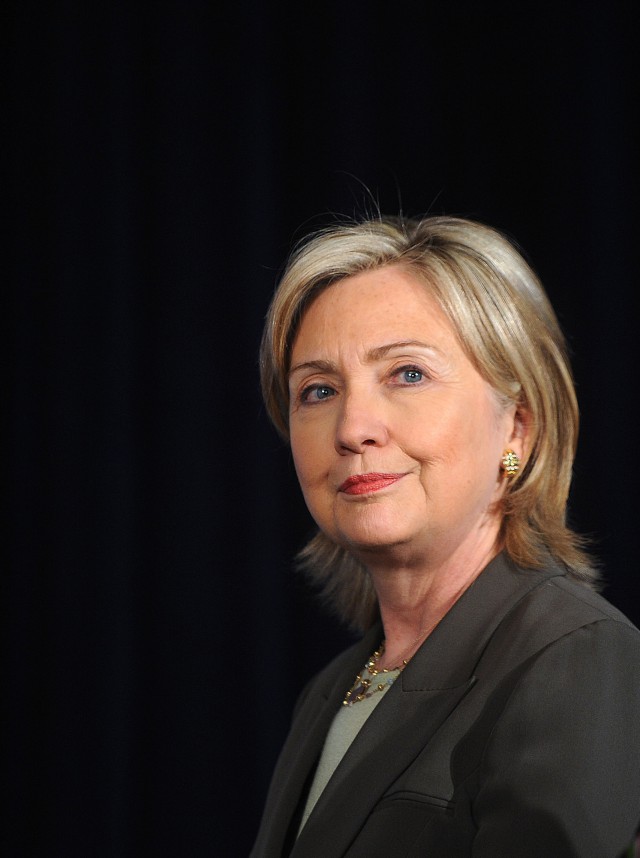
The public clash over the aims of
nuclear program dominated the opening day of a major U.N. review of the
Non-Proliferation Treaty, the 40-year-old pact underpinning the global
system to curb the spread of nuclear arms.
U.S., French and British diplomats walked out of the
during Ahmadinejad’s morning address, in which he charged all the major
nuclear powers were seeking to deny access to nuclear power in the name
of preventing the spread of nuclear weapons.
“It is crystal clear that the hegemonic policy has failed, and the dreams for establishing new empires are vain hopes,” he said.
Clinton accused Ahmadinejad of offering “the same
tired, false, and sometimes wild accusations against the U.S. and other
parties at this conference” in an effort “to divert attention away from
its own record and to attempt to evade accountability.”
“
will not succeed in its efforts to divert and divide,” Clinton said.
“The treaty is weakened when a state flouts the rules and develops
illicit nuclear weapons capabilities.”
Speaking later to reporters, Clinton said only through tough international action would
The conference, held every five years, must approve a final document by consensus, allowing
to block any declaration calling for measures aimed at constraining
what it insists is a peaceful nuclear program allowed under the treaty.
Clinton said after her speech she thought the U.S.
would win the support of a “supermajority” of the 189 nations in
attendance for measures to strengthen the treaty, and “if
The nearly month-long conference is being held as
U.S., Russian, Chinese, French, British and German diplomats negotiate
a fourth round of U.N. sanctions against
Enrichment is used to produce low-enriched uranium fuel for power plants and highly enriched uranium for nuclear weapons.
The program, started with technology purchased from a Pakistani-led smuggling ring, was hidden for 18 years from the
Ahmadinejad criticized the Obama administration for retaining the option of launching a nuclear strike against
under its new U.S. nuclear arms policy, and invited Obama to join “a
humane movement” that would set a timetable for total nuclear
disarmament.
“Regrettably, the government of
Ahmadinejad was referring to the
U.S. nuclear posture review, under which the U.S. retains the option of
using nuclear weapons against non-nuclear weapons countries that are
out of compliance with the treaty, an exception U.S. officials say is
aimed at
“The nuclear bomb is a fire against humanity rather
than a weapon for defense,” Ahmadinejad said. Clinton didn’t directly
respond to the point.
He accused the U.S. and other nuclear powers of seeking to dominate the world by retaining their weapons while ignoring
“One of the greatest injustices committed by the
nuclear weapons states is equating nuclear arms with nuclear energy,”
Ahmadinejad said. “In fact, these states seek to exclusively monopolize
both nuclear weapons and nuclear energy because by doing so they can
impose their will on the international community.”
His speech appeared aimed at
Clinton sought to neutralize Ahmadinejad’s attacks
by recommitting the U.S. to its obligation in the non-proliferation
treaty to reduce and eventually eliminate its nuclear weapons.
She cited the Obama administration’s vow to seek a
world without nuclear weapons, the new nuclear strategy’s aim of
reducing U.S. reliance on nuclear arms, the arms reduction pact signed
with
In a gesture to convince other nations of U.S.
sincerity, Clinton announced that the Obama administration would for
the first time reveal the actual number of warheads in the U.S.
arsenal. Later in the day, the
She called on the conference to put aside
differences that had led to the failure of the 2005 review of the
non-proliferation treaty to reach a consensus on ways of bolstering it.
Delegates, she said, should consider imposing
“automatic penalties” on countries that violate monitoring agreements
with the IAEA, a clear reference to
The conference should also consider penalizing
countries that withdraw from the treaty after using the peaceful
nuclear technology they obtain under the treaty to secretly develop
nuclear weapons, Clinton said. That was a clear reference to
“Potential violators must know that they will pay a
high price if they break the rules. That is certainly not the case
today. The international community’s record of enforcing compliance in
recent years is unacceptable,” Clinton said.
Opening the conference, U.N. Secretary General
to comply with U.N. calls to suspend uranium enrichment and account
fully for its past nuclear activities, including alleged
weapons-related research efforts.
“The onus is on
———
(c) 2010, McClatchy-Tribune Information Services.
Visit the














